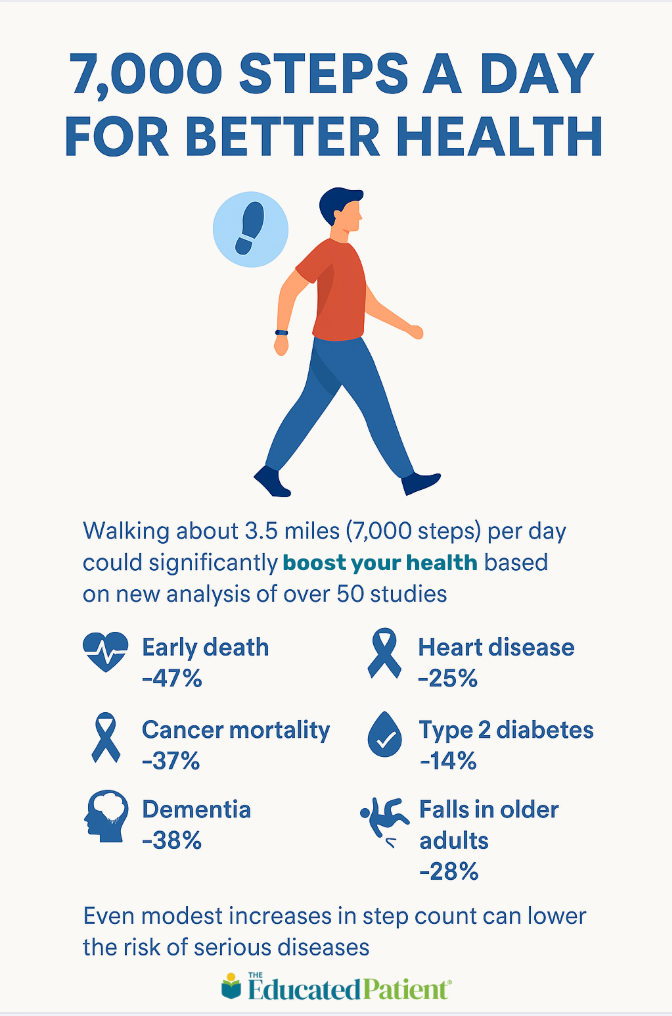7,000 Steps a Day: A Simpler Goal With Big Health Benefits
Daily walking — even well below 10,000 steps — can dramatically improve long-term health, new research shows.
By
Lana Pine
| Published on July 25, 2025
4 min read

Walking just 7,000 steps a day (about 3.5 miles) could significantly improve your health and lower your risk of serious diseases, according to a new analysis of over 50 studies published in the last decade.
While many people have heard the advice to hit 10,000 steps a day, this new research suggests that 7,000 steps might be a more realistic and still powerful target, especially for those just starting to move more.
Previous research has shown that despite the numerous health benefits of physical activity, including a lower risk of early death, one in three adults worldwide is insufficiently active.
This study is the largest to date analyzing the connection between daily step counts (measured by devices like Fitbits or pedometers) and a wide range of health outcomes, such as Type 2 diabetes, heart disease, dementia, depression, mortality and even fall risk. A team of investigators led by Ding Ding, Ph.D., a senior researcher at the University of Sydney, reviewed 57 studies from 35 different groups of people, including over 30 studies that could be combined for detailed analysis.
“Despite some limitations, such as their inability to measure certain types of activity (e.g., cycling or wheelchair-based activities), step counts capture ambulatory activities across intensity, bouts and domains,” explained Ding and colleagues. “This makes them a promising supplementary or alternative metric for physical activity recommendations.”
Of the included studies, most (37%) were conducted in the U.S., followed by the U.K. (21%) and Japan (14%). About half (56%) enrolled adults of all ages, while the rest focused on older adults (aged 65 years or older).
The team found that more daily steps were strongly linked to reduced risks of the following:
- Early death: 47% lower risk when walking 7,000 steps versus just 2,000
- Heart disease: 25% lower risk of developing it, and 47% lower risk of dying from it
- Cancer mortality: 37% lower risk
- Type 2 diabetes: 14% lower risk
- Dementia: 38% lower risk
- Depression symptoms: 22% lower risk
- Falls: 28% lower risk in older adults
The greatest benefits were seen between 5,000 to 7,000 steps, with the health gains leveling off after that for some outcomes — meaning even modest increases can offer real value.
Investigators believe these findings are especially important for older adults or those with mobility challenges, who may find the 10,000-step goal out of reach. The study also emphasizes that more walking is generally better, but “some is better than none.” Even small changes — such as taking short walks during the day — can protect your heart, mind and overall well-being.
While the research is promising, the team pointed out a few limitations. While walking more is clearly linked to better health, some of the findings were based on fewer studies and should be seen as early insights. Most of the research came from high-income countries, meaning the same results may not apply worldwide. Also, most studies only tracked step counts for a short amount of time and didn’t look at differences by age, race or health status. Lastly, people who walked very little in the studies may already have had other health problems that affected the results.
“Daily steps should be considered a practical metric for physical activity guidelines and recommendations,” investigators concluded. “The observed prospective dose-response relationship can inform step-based targets. Future research should account for potential dose-response variations by age, health outcome, device type and measurement methods.”

